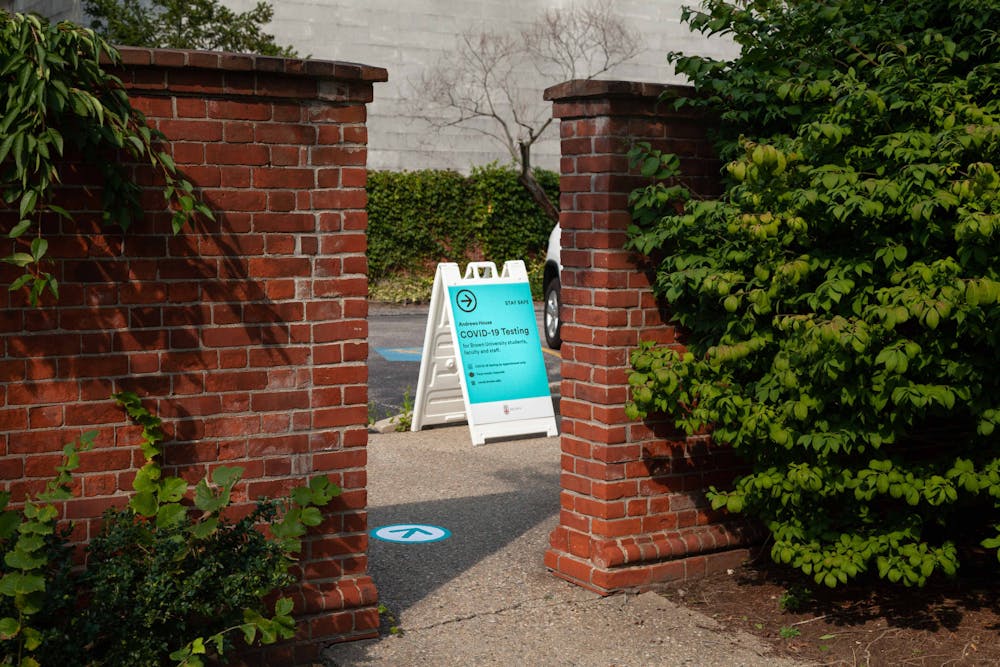The University will no longer require fully vaccinated students to undergo asymptomatic testing for COVID-19, according to an Oct. 25 email announcement, The Herald previously reported. In an interview with The Herald, Executive Vice President for Planning and Policy Russell Carey ’91 MA’06 and University Spokesperson Brian Clark addressed the reasoning behind the decision, as well as testing availability and expectations moving forward.
“We wanted to make this change as soon as we could, but waited until we had data supporting that it would be prudent to do so,” said Carey.
Testing became optional for all vaccinated campus community members except undergraduate students Oct. 6. In the following two and a half weeks after the change, the University observed “no change in terms of the (COVID-19) positivity rate” and “no concerns of severe illness, hospitalizations or indications of virus spread,” Carey said.
The University specifically kept an eye on positive cases during Family Weekend from Oct. 15 to 17 before making the change. “It’s now more than a week past Family Weekend, when we had thousands of (additional) people here, and we’ve seen no increase from that either,” he said.
During the week of Oct. 19 to Oct. 25, there were seven positive asymptomatic COVID-19 cases on campus, according to the Healthy Brown COVID-19 Dashboard. Carey said that this low positivity rate has remained relatively constant since mid-September.
All students will remain enrolled in the testing program and have the option to receive an asymptomatic test once a week. Students can also elect to get tested if necessary for travel or if they are concerned about a potential exposure, The Herald previously reported.
Unvaccinated community members must continue asymptomatic COVID-19 testing twice weekly, or every four days.
All students can also still receive symptomatic COVID-19 testing through Health Services. “If a student presents themselves at Health Services (and) providers assess that someone has symptoms that might potentially be COVID-19, they’ll do a test,” Carey said.
Since faculty and graduate student asymptomatic COVID-19 testing became optional, 25% of employees and 20% of graduate students have continued testing, according to Carey. “I think people are definitely taking advantage of the opportunity to not test as frequently as they were previously,” he said.
In spite of the significant drop in testing volume among faculty and graduate students, the University has not altered its testing sites or schedules. “If we can reduce hours, drop down to one testing site on College Hill and one in the Jewelry District, it will definitely be worth looking into,” Carey said. But, “we have to see how our testing volume is impacted by this (latest) policy shift.”
The University does not directly employ workers at testing sites, so it cannot say how those workers would potentially be relocated in response to the policy. “We contract for testing through a company called Verily, who in turn processes through the Broad Institute, where our samples are processed,” Carey explained. Another company called Advanced Clinical staffs and operates the testing sites.
The University is also prepared to return to a regular testing cadence if necessary with the help of Verily and Advanced Clinical, Carey said. COVID-19 variants, changes in public health guidance or COVID-19 outbreaks on campus would lead to the return of regular testing, increased mask mandates, more restrictive campus activity levels and remote teaching.
In removing required community-wide testing as a safety measure, the current mask mandate on campus — masking for everyone indoors regardless of vaccination status — is serving as an “additional precaution,” Clark said. The masking requirements “are more extensive than what might be required in a near-universally vaccinated population otherwise,” Clark added.
All students, regardless of vaccination status, will be required to test after Thanksgiving break, contributing to the University’s hesitancy about altering testing sites and schedules before the end of November.
Students will need to schedule appointments on day one and day five following their return to campus, or test twice, five days apart, the week after break, regardless of if they remained on campus or in their off-campus residence during the break.
“We have to be staffed appropriately for that week,” Carey said. “We want to manage testing as we have been and make it as convenient for people as possible.”
To enforce testing following Thanksgiving break, the University will continue to monitor student compliance and send reminder emails. “Not complying could be met with disciplinary follow-up,” Carey said, though he does not anticipate that compliance with testing will be a problem given a positive track record among students this semester.
“Student compliance has been excellent in the past. … When students get reminded, they follow right up and schedule (an appointment),” he said. “That’s been the spirit all along. This is a commitment to personal and collective community health.”
Gabriella was a Science & Research editor at The Herald.





